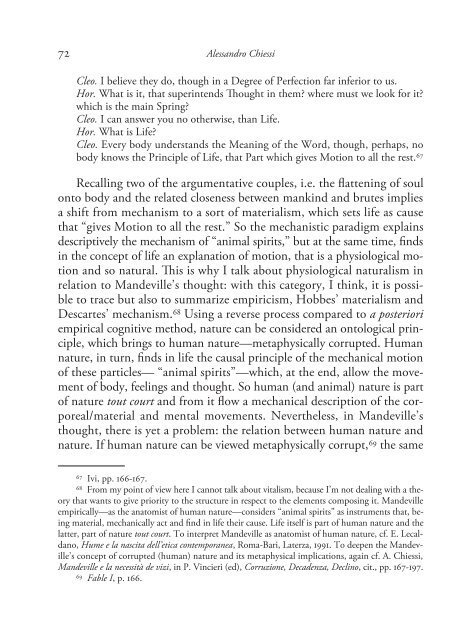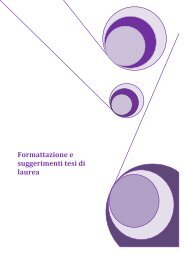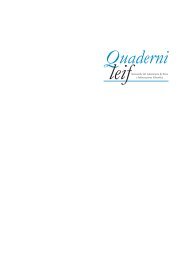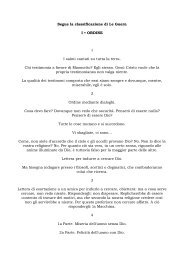qui - maria vita romeo
qui - maria vita romeo
qui - maria vita romeo
Create successful ePaper yourself
Turn your PDF publications into a flip-book with our unique Google optimized e-Paper software.
72 Alessandro Chiessi<br />
Cleo. I believe they do, though in a Degree of Perfection far inferior to us.<br />
Hor. What is it, that superintends ought in them? where must we look for it?<br />
which is the main Spring?<br />
Cleo. I can answer you no otherwise, than Life.<br />
Hor. What is Life?<br />
Cleo. Every body understands the Meaning of the Word, though, perhaps, no<br />
body knows the Principle of Life, that Part which gives Motion to all the rest. 67<br />
Recalling two of the argumentative couples, i.e. the flattening of soul<br />
onto body and the related closeness between mankind and brutes implies<br />
a shift from mechanism to a sort of materialism, which sets life as cause<br />
that “gives Motion to all the rest.” So the mechanistic paradigm explains<br />
descriptively the mechanism of “animal spirits,” but at the same time, finds<br />
in the concept of life an explanation of motion, that is a physiological motion<br />
and so natural. is is why I talk about physiological naturalism in<br />
relation to Mandeville’s thought: with this category, I think, it is possible<br />
to trace but also to summarize empiricism, Hobbes’ materialism and<br />
Descartes’ mechanism. 68 Using a reverse process compared to a posteriori<br />
empirical cognitive method, nature can be considered an ontological principle,<br />
which brings to human nature—metaphysically corrupted. Human<br />
nature, in turn, finds in life the causal principle of the mechanical motion<br />
of these particles— “animal spirits”—which, at the end, allow the movement<br />
of body, feelings and thought. So human (and animal) nature is part<br />
of nature tout court and from it flow a mechanical description of the corporeal/material<br />
and mental movements. Nevertheless, in Mandeville’s<br />
thought, there is yet a problem: the relation between human nature and<br />
nature. If human nature can be viewed metaphysically corrupt, 69 the same<br />
67 Ivi, pp. 166-167.<br />
68 From my point of view here I cannot talk about <strong>vita</strong>lism, because I’m not dealing with a theory<br />
that wants to give priority to the structure in respect to the elements composing it. Mandeville<br />
empirically—as the anatomist of human nature—considers “animal spirits” as instruments that, being<br />
material, mechanically act and find in life their cause. Life itself is part of human nature and the<br />
latter, part of nature tout court. To interpret Mandeville as anatomist of human nature, cf. E. Lecaldano,<br />
Hume e la nascita dell’etica contemporanea, Roma-Bari, Laterza, 1991. To deepen the Mandeville’s<br />
concept of corrupted (human) nature and its metaphysical implications, again cf. A. Chiessi,<br />
Mandeville e la necessità de vizi, in P. Vincieri (ed), Corruzione, Decadenza, Declino, cit., pp. 167-197.<br />
69 Fable I, p. 166.








